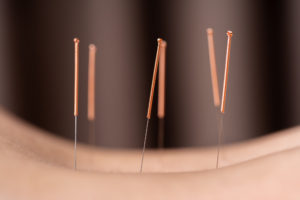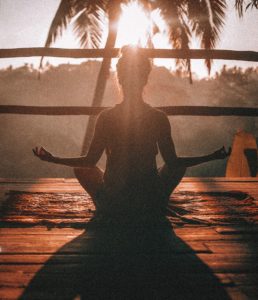6 TCM CONCEPTS
Westerners Can Relate To

Have you ever heard the phrase “lost in translation?” Typically, it’s when words lose their meaning or significance when translated across languages. Although it’s more of a linguistic term, you could definitely apply it to our ability (or inability) as Westerners to accurately interpret and understand Traditional Chinese Medicine (TCM) concepts.
Words like “qi” and “meridians” often sound so foreign that Westerners blow off the concepts entirely; however, once you begin to learn about TCM, you’ll find the perspectives on whole health and wellness to be quite relatable.
To help you learn more about TCM, we cover six crucial concepts that you as a Westerner can totally relate to.
6 Important Concepts to Help You Better Understand TCM
Translating words from Chinese to English probably won’t help you understand the true meaning of TCM concepts. You need more context than just the literal translation…
1. Keep Your “Shen” Up
 “Shen” means “spirit” or “mind,” but really encompasses your consciousness, mental functions, and mental and emotional health. TCM teaches that shen resides in your heart and is nourished by the blood. As such, it is also connected to your vitality.
“Shen” means “spirit” or “mind,” but really encompasses your consciousness, mental functions, and mental and emotional health. TCM teaches that shen resides in your heart and is nourished by the blood. As such, it is also connected to your vitality.
So, how does it work exactly? TCM practitioners will tell you that if your eyes look lively, then your shen is thriving and balanced; if your eyes looks dull or listless, then your shen is suffering, which is indicative of emotional exhaustion, chronic pain, insomnia, or other conditions.
One way to nourish your shen is to invest time in physical activities like yoga, which causes your blood to circulate; it also pushes you to listen to your body’s needs with slow, concentrated movements. So, if you’re feeling down, keep your shen up and look for ways to stimulate your mental and physical awareness!
2. May the “Qi” Be with You
“Qi” literally translates to “energy,” but it’s broader than that. In TCM, it’s also defined as “life force,” “bio-electric energy,” and “vital force.” At this point, you’re probably thinking of Star Wars. Well, guess what? George Lucas based the concept of the force off of qi.
Like the force, qi is present everywhere and can neither be created or destroyed. It simply exists, both within us, the air we breathe, and in the objects surrounding us. While qi can’t help you learn Jedi mind tricks, channeling good qi can help you lead a happier, healthier lifestyle.
Good qi gives you energy, helps you sleep better, balances your immune system, and can even improve your ability to concentrate. If your qi is deficient, however, you are more likely to have low energy, depression, weight gain, and poor concentration.
3. Tea for Two

Tea has been around for centuries. As an ancient beverage, it originated in parts of China and India. Eventually, tea made its way over to England, hence teas like English Breakfast Tea and Earl Grey.
What’s so special about tea is its health qualities. There are thousands of varieties, but they all can be used to benefit our bodies in some way. Now, there are loose leaf tea blends that combine different types of tea to treat specific illnesses and conditions, from anxiety to the common cold.
You’re probably used to drinking green tea when you have a sore throat, or infusing ginger with your tea to make your own herbal concoction. While we might think of tea as a British thing, TCM has been brewing teas for thousands of years.
4. It’s a “Jing” Thing
Another core concept of TCM is “jing,” which means “essence.” In TCM, essence is tied to growth and development, and a big part of that is reproduction. In a sense, jing can be thought of as the equivalent to genes, or DNA.
Jing is responsible for making you, you. TCM practitioners believe that we each inherit a finite amount of jing at birth from our parents. Healthy children have a lifetime’s worth in their bodies, and we withdraw it quicker if we live lives of excess. A life of moderation, however, will keep you in balance and allow you to live a healthier life.
5. Acupuncture
 You’re aware of the West’s love of acupuncture. Specifically, celebrities have embraced and popularized the practice, including household names like Sandra Bullock (who requires it as a contractual perk before taking on roles) and even Jim Carrey.
You’re aware of the West’s love of acupuncture. Specifically, celebrities have embraced and popularized the practice, including household names like Sandra Bullock (who requires it as a contractual perk before taking on roles) and even Jim Carrey.
Acupuncture has been around for centuries, but most of us are aware that the art itself originated in China. The practice itself involves relieving stress with needles by puncturing meridian points located all over your body. The idea is that these meridians, which govern the flow of qi from one organ to the next, are blocked up by stress. To relieve the stress, practitioners prick the meridian points in question with needle-like precision (no pun intended), which allows the qi to flow properly.
What makes acupuncture so interesting is that TCM practitioners can bring the whole body back into balance by analyzing your symptoms and identifying which meridian points are the culprit. For example, you may go to an acupuncture specialist about a rash breakout on your arms. You would expect them to relieve stress in your arms, but your specialist will look for a bigger root issue, which could mean they treat an entirely different part of your body in order to bring balance to the whole.
6. Meditation
 Did you know Oprah Winfrey practices meditation? So does Katy Perry, Madonna, and a slew of other celebrities and successful entrepreneurs. By way of celebrities, it’s no secret that meditation is alive and well in the West.
Did you know Oprah Winfrey practices meditation? So does Katy Perry, Madonna, and a slew of other celebrities and successful entrepreneurs. By way of celebrities, it’s no secret that meditation is alive and well in the West.
Again, we’re probably well aware that meditation was first practiced in India and China centuries ago. But there are some key differences in our perception of meditation in the West. For one, in Asia, meditation tends to prioritize technique over spirituality. In the West, we tend to think of meditation as a means to grow spiritually.
Regardless of why you’re practicing meditation, it can teach you a lot. Discipline, focus, and a deeper connection to your thoughts, intentions, and emotions are just a few ways it can benefit you.
Can you think of other TCM concepts that Westerners can relate to? Let us know in the comments below!
Newer
12 Quick Tips to Prevent Infection & Strengthen Immunity
Older
How to Stay Healthy in the Coronavirus Era
Comments (0)
Leave a reply
You must be logged in to post a comment.




